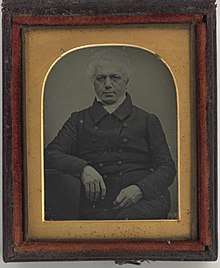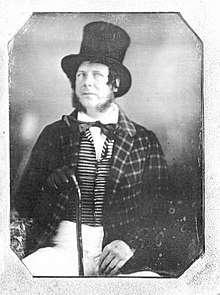Photography in Australia
Photography in Australia started in the 1840s. The first photograph taken in Australia, a daguerreotype of Bridge Street, Sydney, was taken in 1841.

In the mid-20th century, the photographic scene in Australia was shaped by modernist influences from abroad.
By 2011 Australian Census, 9,549 respondents indicated photographer as their main job.
19th century photography

The first photograph taken in Australia, a daguerreotype of Bridge Street, Sydney, was recorded as having been taken by a visiting naval captain, Captain Augustin Lucas (1804-1854) in 1841. The existence of the photograph was indicated in a note published in The Australasian Chronicle on 13 April of that year. Lucas had arrived aboard the Justine, captained by his younger brother Francois Lucas.[1] Lucas, late commander of the Naval School expedition, intended to sell his camera and equipment which he put on display in the office of Messrs. Joubert and Murphey, in Macquarie Place.[2]
Commercial photography began on 12 December 1842 when photographic portraits, at a cost of one guinea each, were made, using the daguerreotype process, on the roof of The Royal Hotel, Sydney.[3] The photographer concerned was George Baron Goodman (1815-1891)[4] the first professional photographer in Australia.[5] Goodman, who had arrived in 1842,[6] took several thousand daguerreotypes in over four and a half years in the colonies. He sold his photographic business to his brother-in-law, Isaac Polack, in 1847, and left Australia in 1850.[7]
The earliest known surviving photograph taken in Australia is believed to be a daguerreotype portrait of Dr William Bland by Goodman.[8] This portrait is likely to be the one mentioned in The Sydney Morning Herald of 14 January 1845.[9]
Thorton Richards Camera House in Ballarat, which opened in 1872, claims to be the oldest camera store in Australia.[10]
RMIT University in Melbourne first taught photography in 1887 as an inaugural discipline, and has done so continuously, making it the oldest ongoing photography course in the world.
20th century photography
In the mid-20th century, the photographic scene in Australia was shaped by modernist influences from abroad. This period saw an influx of people from Europe, including Wolfgang Sievers, Helmut Newton and Henry Talbot. They settled in Melbourne, bringing with them a modern aesthetic and new skills from their training at influential schools such as Berlin’s Reimann School and Contemporary School of Applied Arts. A vibrant and creative culture emerged with many photographers establishing commercial studios around the thriving arts precinct in Collins Street.
After the war, Wolfgang Sievers and Helmut Newton set up studios in Collins Street and Flinders Lane respectively. Other influential photographers such as Athol Shmith and Norman Ikin set up studios nearby.[11]
21st century photography
The contemporary photography industry in Australia is highly competitive. In the 2011 Australian Census, 9,549 respondents indicated photographer as their main job.
References
- Marshall, Peter (2006). "The first photograph". Early Photography in Australia. About.com (part of The New York Times). Archived from the original on 5 March 2007. Retrieved 13 December 2006.
- "The Daguerreotype". Australasian Chronicle (Sydney, NSW : 1839 - 1843). 1841. Retrieved 17 April 2018.
- Australasian Chronicle, 10 December 1842, p.3
- David Combe (2019), George Barron Goodman: revealing the true identity of Australia's first professional photographer, accessed 14 September 2019, combe.id.au
- Davies, Alan & Stanbury, Peter, The mechanical eye in Australia, photography 1841-1900, Melbourne, Oxford University Press, p.8. ISBN 0195546040
- Levi, John S. (2013) These are the names: Jewish lives in Australia, 1788-1850, Melbourne, The Miegunyah Press, p.263. ISBN 9780522862294
- Davies & Stanbury, p.8
- "Daguerreotype Portrait of Dr William Bland". State Library of New South Wales. 1845. Retrieved 17 April 2018.
- "William Bland - full record". PICMAN database. State Library of New South Wales. Retrieved 18 December 2006.
- "Camera House - Ballarat".
- "Melbourne post-war photography". State Library of Victoria. Retrieved 4 July 2011.